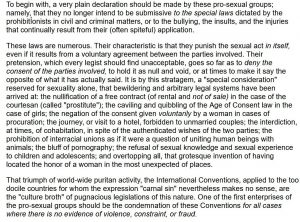One of our staff members is contributing considerably to a News Archiving service at Mu. Any well educated (Masters, PhD or above) users who wish to make comments on news sites, please contact Jim Burton directly rather than using this list, and we can work on maximising view count.
Sexceptionalism

Sexceptionalism or sex exceptionalism is the treatment of sexuality as an area of special interest, particularly with respect to laws against consensual/voluntary "sex acts" (queer sexuality).[2] Scholars have questioned why, for example an array of sex laws are required when existing laws against assault could be used.
Some observers have concluded this form of antisexual exceptionalism has become useful as a "technology of power", i.e. it serves as a convenient tool to distract the populace and service elite interests by creating divisions and culturally contentious narratives. In this way, restrictions on sexual expression have slowly evolved, infecting state/public life as the influence of religion and cultural/family values has slowly waned.
Quotes
It is ordinarily said that criminal law is designed to protect property and to protect persons, and if society’s only interest in controlling sex behavior were to protect persons, then the criminal codes concerned with assault and battery should provide adequate protection. The fact there is a body of sex laws which are apart from the laws protecting persons is evidence of their distinct function, namely that of protecting custom.[3]
Scott De Orio:
The sex-specific nature of sex crime law enshrines the assumption that sex is something that is uniquely harmful, rather than a key aspect of human flourishing, [and] contributes to the stigmatization and demonization of sex itself as well as to the repression of benign sexual variation. “Sex” is not a synonym for “harm,” and the law should not treat it as such.[4]
Aya Gruber:
People widely believe that sexual assault is graver than nonsexual assault, uninvited sexual compliments are worse than nonsexual insults, and sex work is different from work. Criminal codes create a dedicated category for sex offenses, uniting under its umbrella conduct as different as violent attacks and consensual commercial transactions. This exceptionalist treatment of sex as categorically different rarely evokes discussion, much less debate. However, sex exceptionalism is not natural or neutral, and its political history should give us pause. [...] Sex dazzles theorists of all types. For sex crimes, retributivists accept exorbitant sentences, and utilitarians tolerate ineffective ones. Critics of mass incarceration selectively abandon their principled stance against expanding the penal state. Denaturalizing sex exceptionalism and excavating its troubling origins forces analysts to confront a detrimental frame underlying society’s perpetual enthusiasm for punitive sex regulation.[5]
Sex exceptionalism has also been challenged by Alan Goldman in his 1977 article Plain Sex and later by Igor Primoratz in his 1999 book Ethics and Sex.
The disciplinary function of RSO Laws
It has been suggested that RSO (Registered Sex Offender) laws and restrictions serve as a way of disciplining the "special" offender and providing a narrative social routine for the internalization of "sexual offending" exceptionalism by society at large. As a result, the disciplinary scheme routinizes and renders banal, the idea that offenders who subvert the public morals should be treated as more dangerous than con artists or violent psychopaths for example.
By acting as a "second layer" of disciplinary action on top of the sexual offending legal scheme, RSO Laws force individuals (for example, American SOL activists) to invest time and energy into tangential activities. RSOs must challenge their second-class status before challenging the basis for punishing often consensual/harmless "crimes" in the first case.
See also
External links
Quotes
- ↑ Human rights and the denial of sexual freedom
- ↑ Consent and Sexceptionalism
- ↑ Kinsey, A. Sexual Behavior in the Human Male (1948), p4
- ↑ De Orio, Punishing Queer Sexuality in the Age of LGBT Rights (2017), p302
- ↑ Aya Gruber (2022): Sex Exceptionalism in Criminal Law